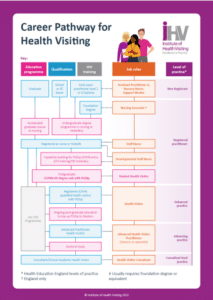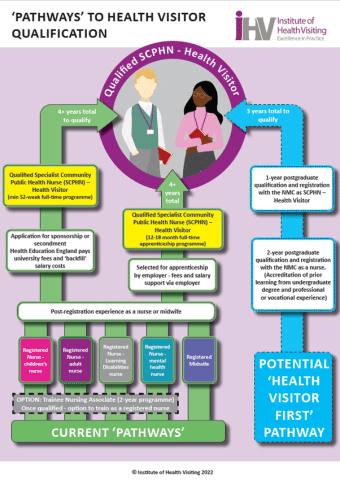If you are thinking of becoming a health visitor, hopefully, you have found a lot of information on this website that has shown you the importance of health visitors in working with families and communities.
To become a health visitor, you need to be a qualified nurse or midwife and then undertake a postgraduate degree to qualify as a Specialist Community Public Health Nurse (Health Visitor). The postgraduate degree programme can be studied on a full-time or part-time basis. The specific course length will be determined by each Higher Education Institution, approved to provide the training, but will be no less than 45 weeks full-time.
You will find information about careers in health visiting and information on the recruitment process to programmes on the NHS Careers website.
iHV has also produced a Career Pathway for Health Visiting which includes the different job roles in health visiting and maps these against levels of practice that reflect registration status, educational development, expertise and responsibility.
All the educational programmes to prepare you to be a health visitor are also on the NMC website.
Preparing to be a Health Visitor
Here, we provide some useful web links and reading suggestions to familiarise yourself with policy affecting health visiting. This can make more sense if you have the opportunity to discuss the role with a health visitor or even observe them in practice. Our webpage ‘What is a health visitor?’ contains more information, and you can gain an insight into the breadth and depth of health visitors’ work with every family from these short iHV films “Health visiting in your community” and “Voices from Practice”.
Since September 2024, all UK-approved training programmes provided by Higher Education Institutions have been working with the 2022 NMC Standards of Proficiency for Specialist Community Public Health Nursing (SCPHN).
An Apprenticeship scheme has been applied to the funding of a few programmes in England since 2021 with some differences in funding, assessment and duration of the programme (typically 18 months). The Apprenticeship Standard for Specialist Community Public Health Nursing (SCPHN) has been updated to align with the NMC (2022) Standards of Proficiency for SCPHN and is now available through the Skills for Health webpages.
Ensure you are up to date with guidelines and policies such as:
England
- Commissioning Guidance for Commissioning and the Healthy Child Programme
- The latest guidance replaces the 4-5-6 model of health visiting – what are the 4 service levels? What are the 5 mandated visits? What are the 6 high impact areas?
- Read the research reports for the early years: Best Start in Life series
- The first 1001 days of life movement
- Health Matters: Giving every child the best start in life
- Read the iHV’s ‘Health Visiting in England: A Vision for the Future’
Scotland
- Check out: https://www.careers.nhs.scot/careers/explore-our-careers/nursing/health-visitor/
- Be familiar with the Universal Health Visiting Pathway in Scotland: pre-birth to pre-school
- Explore the health visiting and school nursing pages of the Children and Young People’s Services Managed Knowledge Network (MKN).
Wales
- Careers Wales – Health Visitor
- HEIW guidance for SCPHN (including funding information)
- Be familiar with the Healthy Child Wales Programme
- The First 1001 Days Programme, Wales
- Wales Safeguarding Procedures – also available in an App
- Wellbeing for Future Generations Act
- Children (Abolition of Defence of Reasonable Punishment) (Wales) Act
Northern Ireland
- Be familiar with the Healthy Child, Healthy Future framework for universal child health promotion (under review)
- Check the policy framework for health visiting services in Northern Ireland
- In Northern Ireland, the SCPHN programme is provided by Ulster University
Personal and professional attributes of health visitors – what employers are looking for (DH 2012)
Be prepared to demonstrate that you are:
- Proactively interested in public health, prevention and early intervention
- Adaptable and influential
- Respectful of different values and take a holistic approach to care
- Supportive and have an adaptive communication style
- Insightful when communicating
- Able to engage others and build partnerships
- Able to demonstrate professionalism
Entry requirements
Students accessing health visiting programmes must:
- Be a registered nurse or midwife. Registration as a nurse can be in any field of nursing (adult, child, learning disability and mental health)
- Complete an enhanced DBS check
- Have a first degree (Academic entry requirements do vary according to HEI but most require a first degree).
Career pipeline for health visiting:
The infographic shows current and potential career pathways into health visiting.
The iHV has recommended a fast-track health visitor (HV) training for graduates which includes a shortened pre-registration registered nurse (RN) training, followed by the specialist community public health nursing (SCPHN) HV training.
This option is currently being explored with higher education institutions (HEI) and, with the right agreements in place, this could enable a fast-track pathway for postgraduates to qualify as health visitors.
Possible interview questions:
- Why have you chosen to apply for a career in health visiting?
- What skills and/or qualities can you contribute?
- What are the commitments such a course involves?
- How do you think you will adapt to being a student and studying?
- In what ways do you consider yourself a professionally committed person?
- Can you tell us what you understand to be the role of the health visitor?
- What factors can you identify that may be impacting the way that services are delivered in the community?
- You arrive at a house to see a child and notice that the child has a slap mark injury to his / her face. Where are your responsibilities? To whom are you accountable and for what?
- What other services do health visitors work with?
- Can you talk about the role of the health visitor and safeguarding children?
FAQs on becoming a health visitor
Q: I would like to train as a health visitor. Is there a course I can take to train directly without training as a nurse or midwife first?
A: The short answer is ‘No’. You have to be registered as a nurse or midwife first and then apply for a Specialist Community Public Health Nursing – Health Visiting course. You may find this webpage useful
At iHV we are keen to promote a more streamlined route into the profession, but this is not available as yet.
Q: I wish to return to health visiting after an extended break. Do I have to undertake a Return to Health Visiting course?
A: The short answer to this question is ‘No’. There is no requirement for this. In fact, there are no ‘Return to Health Visiting’ courses.
As far as the Nursing and Midwifery Council (NMC) is concerned, your practice as a health visitor is dependent on maintaining your registration as a nurse or as a midwife through revalidation. Presently, revalidation should take into account the scope of practice of your intended role such as health visiting, but revalidation has no direct connection to the standards of proficiency for Specialist Community Public Health Nursing – health visiting (although this may change in future). Nevertheless, the standards of proficiency can be a useful reference point for considering how your previous practice, practice-related feedback, and CPD support your practice as a SCPHN-Health Visitor.
If you have maintained your registration as a nurse or midwife and your SCPHN qualification, but you have not been working as a health visitor, there is no additional requirement for the NMC for you to practise as SCPHN health visitor. However, an employer may provide you with an extended programme of induction and preceptorship to ensure that they and you are confident that you can practise safely and effectively. The requirements set down by organisations may vary and could be supported by formal or informal CPD learning activities. However, this is not a formal NMC-approved ‘Return to Practice’ course.
If your registration as a nurse or midwife has lapsed, the NMC provides guidance on readmission to the register by undertaking an approved Return to Practice course. If you undertake a Return to Practice course, you should ensure that you discuss with the course provider that your intended field of practice is health visiting. This is so that practice experience can be relevant to your scope of practice in health visiting. Each person undertaking a course should be supported in returning to their intended area of practice. It is also possible to gain readmission to the register by passing the NMC test of competence.
When you seek readmission to the register, you must decide which additional qualifications need to be registered or recorded.
Q: Are there specific requirements for renewing my registration as a SCPHN?
A: All registrants need to maintain their registration by revalidation every three years. This can be managed online through NMC Online where you can create your own account. There you can view your registration status, your entry on the register, when your revalidation is due, make payments of fees, and manage revalidation. There is comprehensive guidance on revalidation. There is also specific information on renewing your registration as a SCPHN.









